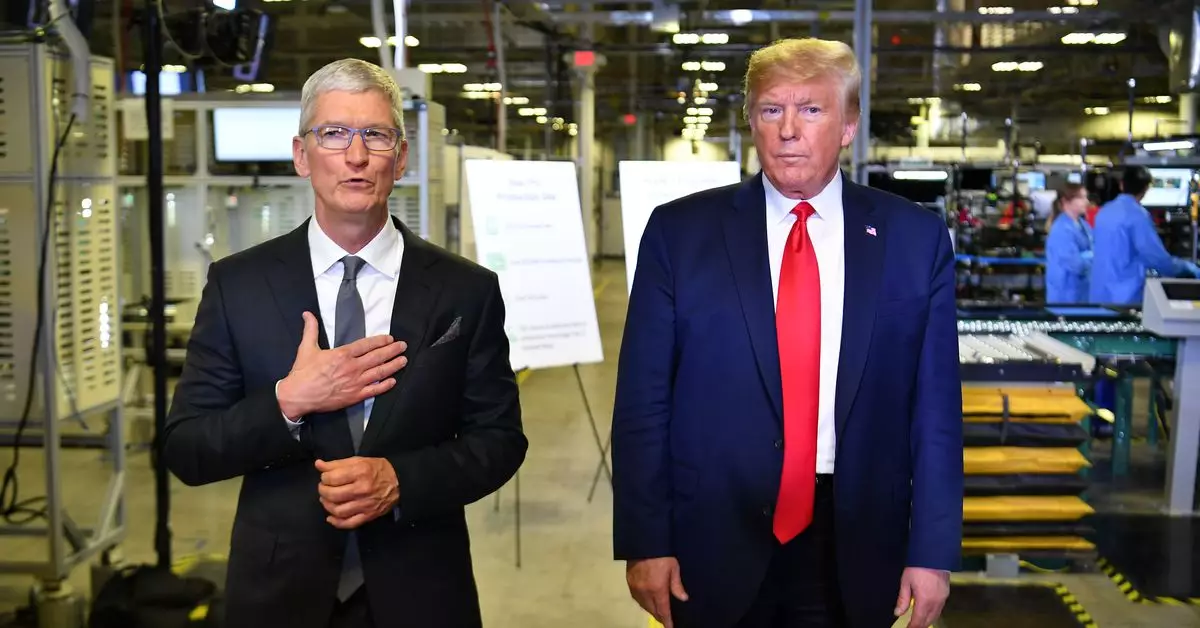In the tumultuous landscape of American politics, few business leaders have successfully navigated the complexities of engaging with powerful figures like Donald Trump. Apple CEO Tim Cook stands out as an exemplar in this regard. A recent report by the Wall Street Journal highlighted the unique approach Cook adopted during Trump’s presidency, allowing him to secure favorable outcomes for Apple while simultaneously bolstering Trump’s standing. This dynamic relationship offers valuable insights for other tech executives looking to influence policy without alienating key stakeholders.
At the heart of Cook’s strategy was a notable departure from traditional lobbying methods. Rather than relying on government relations teams or professional lobbyists, Cook opted for a more personal approach, engaging Trump directly through phone calls and face-to-face meetings. This direct line of communication not only allowed Cook to present his case convincingly but also fostered a sense of uniqueness in their relationship that many others attempted yet failed to replicate. By inviting Trump to his world and demonstrating genuine interest in the president’s agenda, Cook was able to position Apple as a critical player in Trump’s policy decisions.
One crucial element of Cook’s strategy was his emphasis on simplicity. According to the report, during meetings with Trump, Cook would focus on one clear data point, minimizing the risk of discussions growing convoluted. This laser-focused approach allowed for more productive conversations, honing in on specific issues and enabling Cook to advocate effectively for Apple’s priorities. Such simplicity not only made it easier for Trump to digest the information but also contributed to a more straightforward decision-making process in favor of Apple.
Another noteworthy aspect of Cook’s engagement with Trump was his ability to find common ground. By identifying areas of mutual interest, Cook cleverly aligned Apple’s business objectives with Trump’s political goals. This strategy not only garnered goodwill but also provided Trump with the opportunity to present actions that were perceived as beneficial for the economy. The reciprocal nature of this relationship exemplified mutual reliance—Trump looked good, and Cook managed to secure pivotal policy changes.
The Wall Street Journal report indicates that Cook’s playbook may serve as a blueprint for other tech leaders seeking to navigate the often-treacherous waters of political influence. Companies like Boeing and FedEx are reportedly emulating Cook’s direct approach, hoping to foster similar connections with Trump. Moreover, tech leaders are increasingly recognizing the importance of personal engagement in the political arena, often attempting to flatter the former president to gain favor.
As the intersection of technology and politics continues to evolve, Tim Cook’s successful relationship with Donald Trump offers indispensable lessons for business leaders. Crafting personal connections, advocating through simplicity, leveraging mutual interests, and recognizing the importance of strategic reciprocity can empower executives to not only survive but thrive in a complex political ecosystem. Whether the new generation of tech leaders can replicate Cook’s success remains to be seen, but curiosity and ambition seem to drive them forward.


Leave a Reply